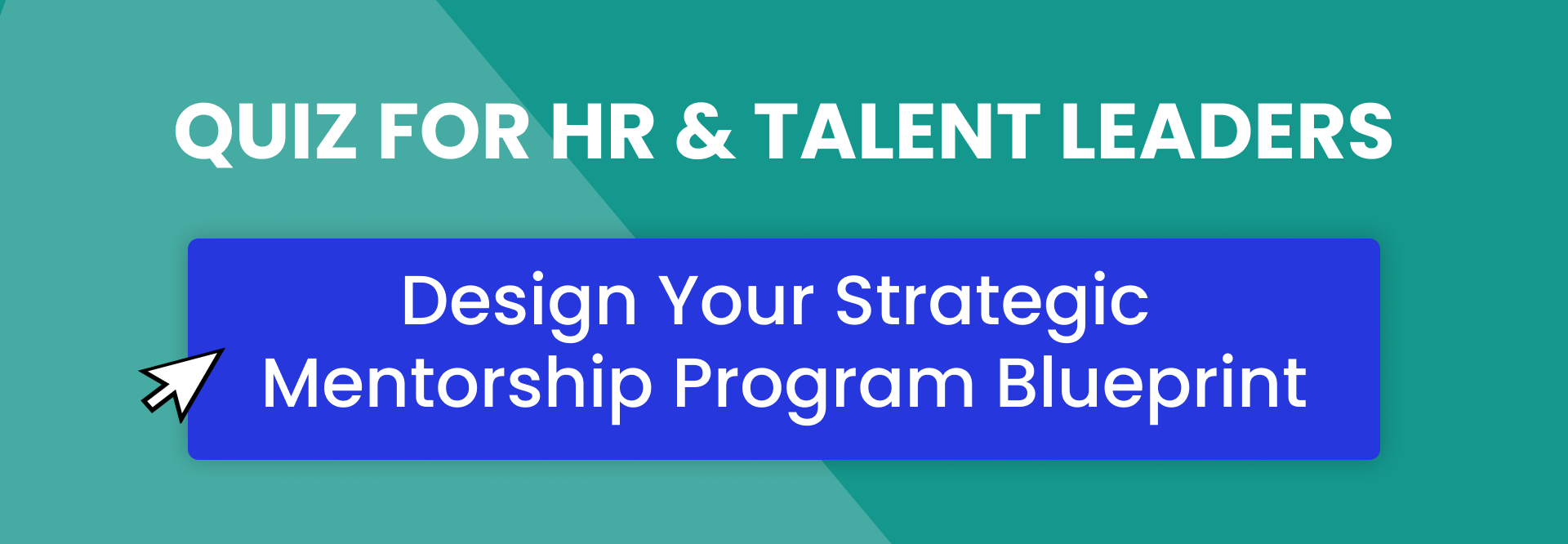Mentorship is often misunderstood as a one-way street—something that exists only to support mentees. But that’s a big myth.
The reality? Mentorship is a high-impact strategy that delivers results across the board. When designed with intention, mentoring accelerates employee development (for both mentees and mentors), advances key HR objectives, and delivers measurable business outcomes.
This article explores the benefits of mentoring from three perspectives—organizations, mentors, and mentees—to uncover the full impact of mentorship and why it’s a game changer to uplevel your talent programs.
10 high-level benefits of a mentoring program
There’s no denying that mentorship delivers value at the individual level. But too often, organizations get caught up in the logistics—designing programs, managing formats, tracking participation—without stepping back to understand the bigger picture first. Mentorship isn’t just about launching a program; it’s about unlocking potential and driving outcomes that ripple across the business.
Let’s look at some of the broader benefits and outcomes of a mentoring program.
“Mentoring is something that I think every successful person and team knows needs to happen. [...] I think the other part that organizations often forget is—if you were to just remove all of this from an organization—there's so much data that shows that without relationships, without networks, without mentors, you're just not going to service your clients as effectively.” - Dave Wilkin, Cofounder, 10KC
1. Boosts employee engagement
Employees who are engaged are more productive and perform better in their roles, with organizations that prioritize employee experience and engagement generating four times more profit than their counterparts.
As employee engagement falls to a 10-year low, mentorship is increasingly being used as a strategic tool for boosting engagement. Mentoring provides participants with opportunities for skill development, career growth, and workplace connections that give them a sense of purpose in their day-to-day life, resulting in higher levels of engagement.
2. Supercharges employee development
Mentorship puts employees in the driver’s seat of their own career growth and development.
With linear career paths and ladders no longer the norm, mentorship offers employees insight into growth opportunities within your organizations—while providing them the skills, knowledge, and visibility to make those meaningful strides in their careers.
3. Enhances skill development
We know that humans learn best from other humans. Mentorship facilitates the social learning opportunities that help employees hone and develop their unique skill set. Rather than relying on one-size-fits-all training, mentoring unlocks the skills and competencies that allow individual employees to thrive in their roles and advance their careers.
📌 READ MORE: The Employer Guide to Skill Development
4. Supports internal mobility
Internal hiring is a smart strategy for filling vacancies and closing skills gaps. It reduces time-to-hire rates, improves company culture, and saves on hiring costs. And employees who make internal moves are 40% more likely to stay with the company for at least three years.
Media and communications company Dentsu Aegis, found that four out of five participants in their mentorship program were able to identify new areas within the organization they were interested in working in. Mentorship not only equips high-potential employees with the skills and knowledge they need to make lateral and vertical moves, but it also boosts exposure—ensuring employees understand the opportunities available to them and get valuable face time with key decision makers.
5. Improves employee retention
According to the 2025 LinkedIn Workplace Learning Report, 88% of organizations are concerned about employee retention—with learning opportunities leading the way as the top retention strategy.
Mentorship and peer learning provides employees with the learning and development opportunities they crave while also creating connections that boost belonging and loyalty.
6. Accelerates DEI goals
Access to mentors can help underrepresented talent gain the key skills, knowledge, and visibility they need to further their careers.
When mentorship intentionally uplifts diverse talent, it ensures they have the same opportunities as their peers, regardless of their background. PwC’s mentorship program scaled to over 20,000 employee connections—with 91% of connections created between different inclusion networks, furthering diversity, equity, and inclusion (DEI)—leading to a more inclusive workplace that fosters innovation, creativity, and belonging.
7. Deepens employee satisfaction
Happy employees are up to 20% more productive. And mentorship has been closely linked to employee satisfaction. One survey found that as many as 91% of employees who have a mentor report being satisfied with their jobs.
Mentorship creates a foundation for meaningful workplace connections that improve belonging. It empowers knowledge sharing around broader business goals and helps employees feel valued, so they have a sense of purpose and pride in their work.
8. Increases collaboration across teams
Mentorship–particularly cross-functional or even cross-location mentorship—can break down silos and promote collaboration across organizations. When employees are constantly heads down, it can be easy to miss opportunities outside of their immediate team.
By creating opportunities for dialogue between employees who may otherwise never cross paths, mentorship can unlock unexpected opportunities for collaboration that boost innovation and results.
9. Enables institutional knowledge sharing
The amount of knowledge available within your organization is immense. Knowledge sharing creates opportunities for employees to transfer this knowledge among their peers, preventing loss of critical institutional knowledge and creating a culture of continuous learning and development.
Mentorship creates structured opportunities for this information to be passed between the right employees, so valuable expertise and experience are not only retained but also leveraged for organizational growth.
10. Amplifies understanding of the business and customers
Mentoring opportunities connect employees across the organization so they can gain context outside of their individual roles.
“One of the professional service firms that we work [....] very deliberately, as part of their leadership development, wanted to connect [senior employees] to understand their clients from a different vantage point. [...] We've seen our most recent data, half of those conversations have turned into opportunities to collaborate across groups. Which in their case means actual revenue generation and better client service.” -Christine Silva, Talent Advisor, former leader at RBC, Catalyst, Shopify
When programs connect the right employees, they can explore perspectives and knowledge from other teams. For example, a product manager who is paired with a customer success representative now has a direct line to first-hand customer feedback. And connecting with leaders and other functions helps participants gain insight into how their work contributes to broader business goals.
💡 LEARN MORE: Mentoring Outcomes Powered by 10KC

5 benefits of mentoring for the mentor
Another common misconception around mentoring is that it’s a top-down, one-way street where mentors are expected to pass down their knowledge and experience with little to nothing in return.
In reality, being a mentor is a rewarding and impactful experience. Having a clear understanding of the benefits can be critical for boosting mentor participation and engagement rates—and creating a mentorship program that’s valuable for everyone involved.
“Just as much as the mentor may have experiences that they can share from their own history that are useful, we often find that the mentee also does, too. They're just different sets of experiences, especially when it comes to mentor -mentee relationships who might have come from different generations.” - Catherine Brown, Director, Leadership Programs, Netflix & Founder, Taybridge Leadership
1. Sharpen self-awareness and emotional intelligence
The best mentors are the ones who are open and honest, encouraging their mentees to reflect on their own experience and opportunities. But without someone prompting you to do so, that reflection is often easier said than done.
While mentorship often focuses on the mentee, it also creates an opportunity for mentors to have open conversations about their own experiences and how they can approach situations differently.
2. Level-up leadership game
Being a mentor isn’t quite the same as being a manager or a leader but it does provide the opportunity to hone many critical leadership skills. Mentors have the unique opportunity to work on their feedback and coaching skills while creating safe spaces for their mentees, all of which makes them stronger leaders.
Giving employees the chance to be a mentor—especially those who aspire to a people manager or leadership role—can give them a chance to develop those important skills while imparting wisdom and nurturing the next generation.
3. Gain invaluable new perspectives
We often reach out to those with more experience than us for insight and expertise. But we don’t always get the opportunity to speak to those in different functions or even earlier in their careers. Just becomes someone doesn’t have more experience in the traditional sense, doesn’t mean their insights and perspectives aren’t incredibly valuable.
Being a mentor opens the doors for them to connect with those who have varying backgrounds and may even experience the same workplace differently. It’s why intentional programs, like reverse mentoring, can be so impactful for innovation and empathetic leadership.
4. Rekindle passion for work
When you’re stuck in the grind, it can be easy to lose sight of the big picture.
Mentoring gives employees the opportunity to step back and rekindle their love for their role and expertise. It gives them space to reflect on the things about their work that they’re passionate about, providing a sense of purpose that can encourage engagement and satisfaction in other areas of their job.
5. Get kudos and meaningful recognition
Workplace mentorship can’t happen without mentors, and they should be recognized as such. As program managers, it’s important to take the time to show mentors that they’re valued by sending updates to their managers and creating official channels of acknowledgement.
While employee recognition is valuable in all aspects of the workplace, being a mentor creates an opportunity for employee recognition outside of their core roles. It nurtures well-rounded employees who want to participate in and see the value of contributions beyond their day-to-day duties.
📌 READ MORE: 10 Leadership Lessons Mentors Can Learn From Mentees
5 benefits of mentoring for the mentee
Of course, we can’t forget the benefits of mentoring for mentees. Let’s explore some of the most valuable mentoring benefits for mentees.
1. Feel genuinely valued, supported, and connected at work through focused development opportunities
Employees want more than generic development programs—they want to feel genuinely valued. Mentorship delivers personalized support that centers on each individual’s goals, making it clear that their growth matters. When one in five employees across the world feel lonely at work, it creates space for meaningful relationships that combat isolation and build connection, especially in hybrid and remote environments.
2. Enhance problem-solving, decision-making, managerial skills, and more
When done right, mentorship offers a safe space to navigate challenges, gain perspective, and build critical skills. Whether it’s early talent refining time management and collaboration, mid-career employees sharpening their problem-solving and strategic skills, managers enhancing coaches skills, or leaders strengthening their business acumen, mentorship supports growth at every level. It’s a collaborative environment where participants build confidence, learn from feedback, and develop the capabilities they need to be more effective in their role.
3. Improve communication and interpersonal skills for better collaboration
Strong mentor-mentee relationships require open communication and honesty from both sides. Everyone needs to align their efforts and stay focused on their goals. This means mentees need to effectively communicate their challenges and successes, so their mentors can work with them to truly succeed.
These skills are equally valuable in peer mentorship, where open dialogue and shared experiences create a collaborative learning dynamic that benefits both participants.
Tip: Conversation guides and curriculums can be an invaluable tool for honing those conversation skills and fostering open communication.
4. Unlock clear opportunities for internal mobility
Mentorship helps many mentees unlock the answer to the question, “What’s next?” Sometimes it comes down to not knowing what roles are available, and other times it’s simply because they don’t know what the next best step is.
Having conversations with a mentor can help mentees identify roles of interest while carving out a path to reach those roles, whether that’s connecting with the right hiring managers or bridging skills gaps.
5. Gain a broader enterprise understanding
It’s common for employees—especially individual contributors in more junior roles—to feel removed from larger business goals. This can make it challenging for them to effectively contribute because they don’t see how their tasks impact customers and organizational success.
Mentorship connects employees with the leaders and stakeholders who can connect the dots. It not only helps employees feel invested in the company but also gives them the business acumen to identify ways they can make a bigger impact.

The cascading benefit of mentoring across an organization
Without the right relationships, even the best talent programs fall short. From early talent to senior leaders, people don’t grow in isolation. Mentorship and peer learning are what turn development from a checklist into lasting impact.
Without mentorship, you’re missing the link between potential and progress. Real development happens in conversation. Mentorship makes it stick.
When done right, mentoring never impacts one individual or even one metric, it’s a catalyst for growth and development at every level.
Mentoring benefits all employees
At its core, mentoring benefits all employees by supporting their personal and professional development. It’s a high-impact initiative that activates talent through multi-dimensional opportunities that allow individual employees to thrive, boosting satisfaction and morale.
Horizon Media’s mentorship program, for example, boasted a 98% satisfaction rating for mentor-mentee conversations—with positive trends in employee connectedness, career development, and personal growth
Mentoring benefits HR objectives
One step above employees is your talent and HR objectives—the ones with quantifiable metrics that matter to key stakeholders and tie back to your business goals.
Mentoring has proven to move the needle on HR objectives such as:
- Employee retention
- Employee engagement
- Employee development
- Employee promotions and internal mobility
- DEI outcomes
- Employer brand and reputation
- Recruiting outcomes
While the talent outcomes aren’t always immediately visible from the outset, keeping an eye on these lagging metrics is how you can measure the business impact of mentorship beyond program-level success. With the help of 10KC, Spring Health’s ‘Sprout with Spring’ mentorship program contributed to an over 50% decrease in attrition rates.
Mentoring benefits the business
And finally, those metrics ladder up to the benefits that propel overall business growth, such as:
- Improved team performance
- Better cross-functional collaboration and innovation
- Better customer service and satisfaction
All of which fuels one of the biggest goals for any business—increasing revenue.
CI Financial puts this into practice, using mentorship strategically to span across different levels of the business, connecting individual employees to the larger organizational goals that drive business performance.
“Wealth management is a very complex business. So many people have to touch something from when the client first comes to an advisor to when a transaction gets processed. And we often just don't have enough dialogue between our teams to know what's really happening in the business. So with mentorship programs, it's really a chance to learn more, both on a personal level, but also about what's going on in the business to create a more agile and open, open-minded organization.” - Sarah Schroeder, Head of HR Business Partners Canada, CI Financial
Unlock the benefits of mentoring at scale with 10KC
10KC’s mentoring software empowers the world’s leading organizations to deliver high-impact mentoring programs that benefit employees and the business.
With smart-matching, personalized mentoring pathways, dynamic experiences, and robust analytics and reporting across all levels of the business, 10KC is your partner in mentorship success.










.png)